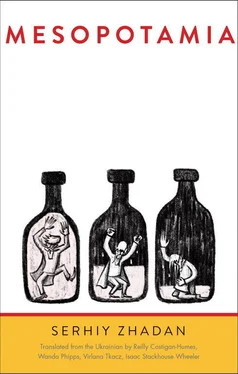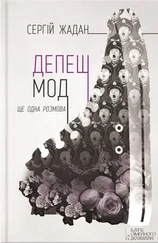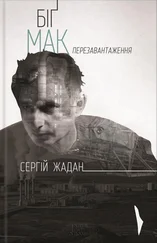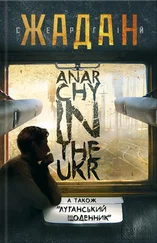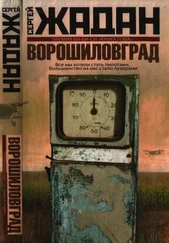That night, he decided to send Olia a text, something about how at such a late hour, when demons whiz by overhead through the sticky air and the smoke thickens in kitchens smelling of poppy seeds and cacao, he, like a grizzled old pirate, could spot the glow exuded by her apartment in the middle of the lilac night and sniff out the tender aroma of her skin with his acute, ratlike sense of smell, feel her fluttering down into a pool of dreams, as into fragile and weightless Christmas snow. Something about how he was keeping watch, protecting her tranquillity and warding off the demons with the smoke from his Cuban cigarettes while frosty crystals coalesced on her lips. He reread it and thought that the part about the poppy seeds was a bit much. He decided to destroy the message but pressed the wrong button, so it got sent to her after all. He stood there, waiting with trepidation for a reply. At around four in the morning, when the last few demons melted away in the morning twilight, his phone died.
She called after lunch.
“What were you texting me about cacao for?” she inquired.
Thomas got defensive, fabricating a mysterious, convoluted story about the events of last night, about shady characters and their family problems, about late-night calls and nighttime drama, about his futile attempts to comfort and reconcile everyone, about taxi rides and journeys across the city by night, about unveiled threats and solemn oaths. Obviously, the smell of cacao had no place in this story; he got himself so mixed up all he could do was suggest they get together soon.
At the Georgian joint where they met up, she greeted the waiter, who responded cheerfully, seeming to recognize her, then nodded reverently at Thomas, immediately starting to recommend some specials and caution against ordering others. Thomas had made a point of dressing casually—a short-sleeved button-down shirt and khaki pants—so he was feeling pretty self-conscious without his signature tie, like a dog who’d been let off his chain for the night and was just dying to get back on it. “How does he know her?” he thought, looking at the waiter suspiciously. “Is he somehow part of her past? Just how many men are there in that past of hers? Is she going to be saying hello to all of them?” Thomas was anxious and he got hammered without even realizing it. Olia got a kick out of it all. “Good work, man,” she said. “Keep drinking. You’re more fun drunk.” He drank but remained vigilant. “Just keep it under wraps. Don’t let on that you know. Just don’t drop any hints,” he reminded himself. At first, he talked about work, said his clients just whored themselves out for money and then bit his tongue; he discussed politics, started telling a story about members of Parliament from the ruling party hiring young male escorts, then changed gears halfway in and recalled a gruesome crime scene from the paper—some priests had gotten busted in a closed sauna—but then she told him to cut it out. Eventually, he switched to sports, sizing up the waiter and saying that he clearly used to be a boxer.
“His nose is all flat and stuff.”
“Yep, he did used to be a boxer,” Olia said, confirming his suspicions. Thomas couldn’t take it anymore.
“How do you know him?”
“Whatever happens happens,” he thought, floating through a haze of alcohol. “I just have to know.”
“What do you mean? He comes to our bar. He’s a Manchester United fan. He comes to my joint and I go to his. Isn’t that funny? Sometimes it feels like most restaurant customers are just waiters from other places around town. Do you like waiters?”
“ Waitresses, ” Thomas answered hastily. “I like waitresses. ”
“Oh, I like waitresses, too. I used to date one. Her name was Kira. She lived by the tractor factory, did yoga, and could go without taking a breath for a long time… a long, long time. You’re looking at her and thinking, ‘I gotta call the ambulance, get up, get dressed, and run down to the police station to report her death.’ And then she exhales. I felt so sad and empty; I was eighteen and life seemed unbearable. That’s when we met. Want me to introduce you to her?”
“I do,” Thomas said, nodding his head sloppily. “I really do.”
“All right, I will,” Olia promised. “Want me to call her up right now?”
“I do,” he said, sucking the last gulp of a Georgian red straight from the bottle.
He wanted to meet all her girlfriends, size up all her men, peer into all her acquaintances’ eyes, hug all the boxers and duke it out with all the wrestlers in town, challenge all the bartenders to knife fights, and trounce all the valets at dice. He wanted to hear from her girlfriends what they said to her before she went to bed with them, what arguments they presented, and what they promised. He wanted to hear from her men about how she looked before she got that boyish haircut—what her natural hair color was, what she looked like in the morning—untouched by all that black makeup—what she said in her sleep after everything that had transpired the night before, how she spoke when she was drained by exertion and silence. He wanted to sit down with her teachers, he wanted them to tell him about her accomplishments, about her good behavior, about her passion for chemistry and sports, about the color and cut of her school uniform. He wanted to have a drink with her shop teacher and bond with her history teacher, gaze deeply into her assistant principal’s eyes and smother her homeroom teacher with kisses, he wanted to be in her life, be next to her, close enough to feel the blood flowing under her skin. He wanted to be privy to all her secrets and all the riddles she had tucked away in the depths of her memory, know all of her countless stories word perfect, correct her mistakes, dispel her doubts, become part of the action, explore her life like a suitcase found in the attic of someone else’s house, sit there and sift through precious evidence of other people’s emotions, other people’s laughter. He wanted to manage it all, he wanted to be involved in everything.
Once they were outside, she persuaded him, with considerable difficulty, that this wasn’t the time for a scenic drive through the countryside. “All right, fine, but where are those waitresses of yours?” he asked. Their first stop was across the street, a place run by Turks, where he trudged through an endless love song, teaming up on the karaoke machine with some blubbery, mustached, glistening old woman, and then trying to tip one of the customers. All the patrons at this establishment were Turks, so figuring out who was an employee and who was a customer wasn’t too easy. Then Olia dragged him from one shady establishment to another. They popped into all the burrows and basements she could possibly think of—paid the Arabs a visit, of course, stopped by the Vietnamese joint, naturally, became best buddies with the guys who worked at the McDonald’s (they were used to this kind of thing by now), enjoyed a few rounds, arms intertwined, with the staff of the TB clinic, tried to order some champagne at Health, the local sauna, though their efforts were thwarted, reminisced about their respective childhoods in a dark basement across from the synagogue, and looked for escorts at a family restaurant where they were cleaning up the aftermath of a children’s birthday party—he spilled a milkshake on his lap and kept trying to scrub the stains out with herbal liqueur. He asked for written directions at the pizzeria, and caught some cognac fumes back at the Georgian joint, because every other place was closed by then. They had live music, and he performed some Irish folk dances, getting in the waiters’ way and driving her into a joyful frenzy.
Sometime after midnight, they wound up in front of his apartment building, and he said, firmly, or at least that’s how it sounded to him, “You’re not going anywhere. You have to stay with me. That’s how it’s gonna be.” He made a convincing case, so she didn’t even bother objecting.
Читать дальше
